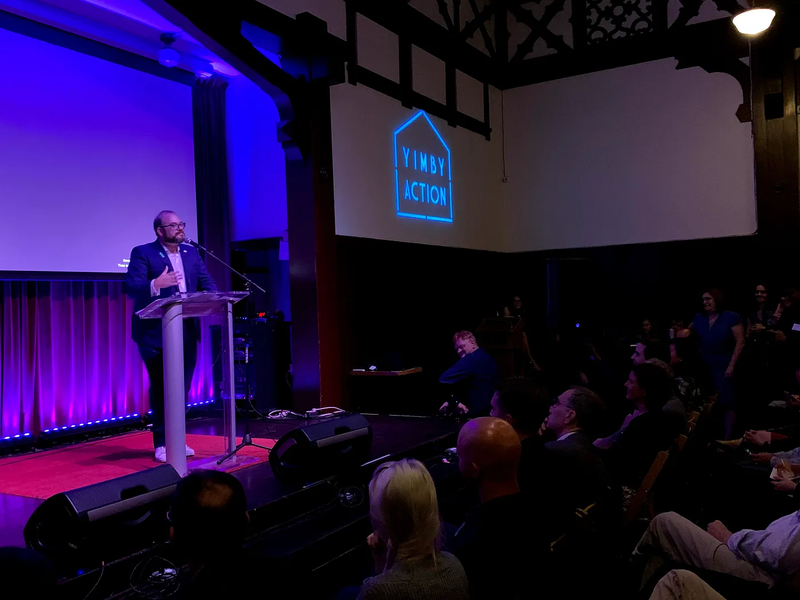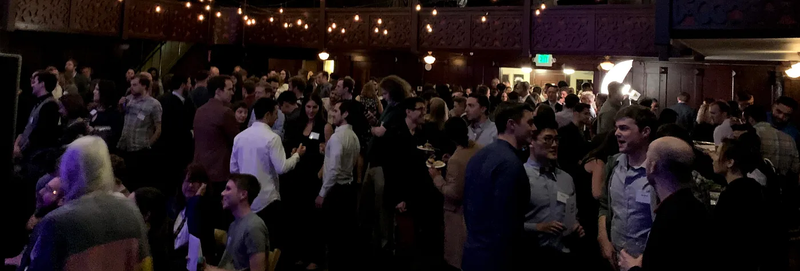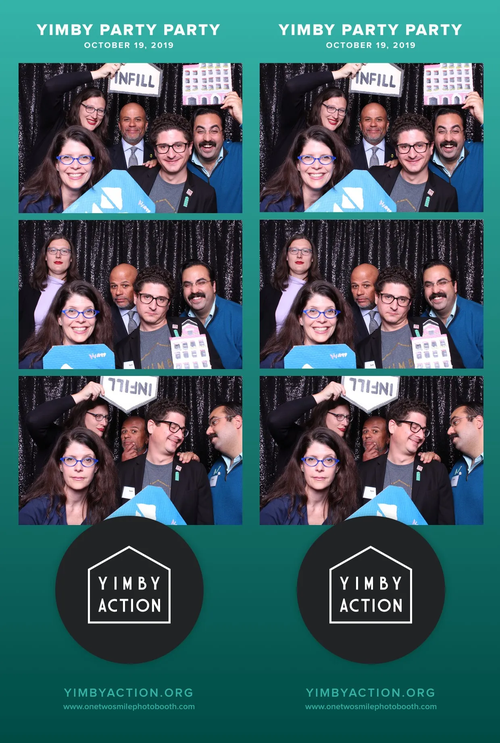“HELLO YIMBYS!”
I truly cannot express how thrilling it is to be here at this event. One of the weird things about being a writer is it’s an occupation that attracts antisocial weirdos. But if you have any success at it, people start asking you how to solve social problems. The thing is, problems get solved by activists and organizers who engage and mobilize the public. Problems get solved by politicians who win elections and build coalitions around policies. Problems get solved by donors who have vision and by fundraisers who are good at talking them into things. Weird antisocial writers don’t know how to do that stuff! It’s the people in this room who have the answers and I’m grateful to be here with you.
What I can do is tell you how incredibly far this movement has come.

Years ago this movement didn’t have a name in part because there was no movement. But I was writing about housing policy issues and the challenges that come from scarcity.
I even wrote a short book about it. And when I did my editor said the end was bad, and I needed to offer some solutions.
So I said a lot of people need to read this book, decide it’s right, and then figure out how to do mass politics because I sure don’t know. I’m a dumb writer. Well; he didn’t like that so I threw in a boring technical policy idea about transportation grants.
Then about a year later I got a call from the White House (the good one, not Trump) to see if I could come in and hear about something the economic team was working on. So being amenable to flattery I did.
YIMBY sidebar: You would think the most powerful people in the government of the mightiest empire the world has ever known would have nice offices but they’re actually totally dismal. Everyone important wants an office close to the president, but because of historic preservation they can’t make the Executive Office Building any larger so you’ve got all these people crammed into weird, dismal conditions. Congress is the same way. Nobody’s going to cry for powerful politicians but I happen to think this is a dumb way to run a country.
Anyways we’re in there and they proudly announce that they’ve done the math on a bunch of widely discussed ideas to boost American economic growth and basically none of them move the needle at all.
Except removing barriers to housing production. So I’m like “great; what are we going to do about the barriers to housing construction?”
Their plan was to do nothing. They just wanted to point out that other people’s growth ideas were bad. They said they’d do a Council of Economic Advisors report that said housing was important; and they asked congress to create a small grant program inside HUD that would offer technical assistance to local governments that wanted to pursue zoning reform.
Well that’s not going to do anything I said. And they didn’t disagree. But what did I want them to do. I said Obama should show up at a community meeting somewhere and yell at the NIMBYs about how they’re ruining the country. Still think that’s a good idea! But they didn’t go for it.
Obviously, though, what we needed was a popular mass movement with charismatic leaders and savvy organizers and donors and elected officials who championed the cause. But these economics nerds in a weird basement weren’t going to get it done.
Anyways I could tell you other war stories of the “weird basement” era of national housing politics but I think it’s actually better to flash forward.

In journalism we’re bad at doing practical political organizing but we’re good at glib predictions. So back last winter I was supposed to make a glib prediction and I said 2019 would be the year that housing reform broke through into the mainstream.
And it was! But before I talk about that I actually want to talk about one sneaky-important thing that happened in 2018.
There’s a guy named Willian Fischel, an economist in Dartmouth who actually served on the town planning board up in Hanover who did a lot of the original work on zoning, housing costs, and what he called “the homevoter hypothesis.” He wrote a book called “Zoning Rules!” (with an exclamation point which makes it sound like zoning is good when actually the thesis is that it’s bad). And his version of a technical fix was that congress should phase out the mortgage interest and property tax deductions to gradually shift the balance of renters vs homeowners and transform national politics. I was skeptical that this was at all feasible, but congressional Republicans actually did it back in 2018.
I’m not going to try to get a round of applause going for Paul Ryan because I’m not suicidal. But my point is just a few years back this was the biggest idea one of the top minds in the area could come up with for reforms.
Now in the states we are doing much more visionary stuff.
I probably don’t need to tell you guys about California, but I can tell you that Scott Wiener’s legislation on mandatory statewide up zoning has been an inspiration to people back east. That was an idea big enough and dramatic enough to get the attention of everyone who follows housing policy in DC, and that alone has had a huge feedback effect on the entire national dialogue. The only problem is the law hasn’t passed … yet.
But the attention it’s gotten has been tremendous and has done tremendous good out of state. The only problem is a lot of people who follow this dialogue at a distance have the view that California is a story of housing reform failure when really there have been so many successes.
The latest Accessory Dwelling law, in particular, is a huge thing. Triplex zoning everywhere. It’s mind-blowing. It makes the stuff we’re talking about in the Northeast look like little baby nonsense. And what’s particularly inspiring about it is that you guys have taken bite after bite after bite at this ADU apple now. It’s a sable, entrenched political coalition.
The new bill banning cities from doing downzoning should do good and, again, be a model for elsewhere. It’s also important because just conceptually if the state government accepts that downzoning are bad because they restrict housing supply … well what’s the opposite of a downzoning?
So you guys have all kinds of problems still in your state legislature but frankly those bills alone make California look like the greatest geniuses on the planet compared to what we’re dealing with in the east.
And of course we’ve had statewide zoning reform in Oregon, a big citywide move on triplexes in Minneapolis, and they’re taking some baby steps toward statewide reform in Washington.
But what’s really interesting is how the national political conversation has changed.
At the beginning of the year, I was talking to Julián Castro’s staff about an interview I was supposed to do with him at South By Southwest. I told them that since he used to be HUD Secretary and a big city mayor, I wanted to talk about housing policy.
They were super-skeptical, “nobody cares about housing.” But I gave them the hard sell and, lo and behold he actually knows a lot about housing! I was very impressed.
But then a crazy thing happened on the way to the nomination.
Kamala Harris released a housing plan.
Then Cory Booker released a housing plan with a YIMBY element.
Then Elizabeth Warren released a really big housing plan with a big YIMBY element.
Castro did one too.
Joe Biden & Mayor Pete put out housing planks in plans that weren’t even specifically housing-focused; and with YIMBY elements.
Last but by no means least, Bernie Sanders, scourge of neoliberal shills and market lovers everywhere, released a plan that denounces exclusionary zoning and calls for more density.
We’ve gone from a president who thinks there’s nothing he can do on housing to an environment where every presidential candidate under the sun has YIMBY ideas; it’s a huge, huge, change.
And it’s coming to congress, too. For some reason Senator Todd Young, a Republican from Indiana who nobody’s ever heard of, out of the blue introduced a bill he calls the YIMBY Act.
Scott Peters from San Diego has an honest-to-god bipartisan group of legislators behind something he calls the Build More Housing Near Transit Act that would link New Starts funding to making zoning changes,.
Neither of these bills is a panacea that will single-handedly fix America’s housing crisis, any more than California’s ADU bills will. But what matters is creating political coalitions that realize housing supply matters, and we’re seeing more and more members of congress recognizing that reality.
There’s a book I like a lot that has really profound insights but that unfortunately nobody reads because it’s written in super-technical boring language. But it’s called “Lobbying and Policy Change: Who Wins, Who Loses, and Why” and it amasses really big systematic evidence on this question.
And it has a finding that some people find depressing but I actually find kind of inspiring. What they show is it’s not the case that the side with the most money usually wins political fights in America; instead the status quo just tends to win. But when the status quo loses, it’s very unpredictable how or why. Things look totally impossible and then suddenly they happen.
Some people think it’s depressing because it’s sad to know the status quo normally wins.
But I think anyone who’s worked in the trenches in politics knows that already.
What’s inspiring about it is they show that you don’t actually need to somehow outspend the mightiest and most entrenched forces out there.
What you do need to do, however, is get on the agenda. You need enough money to do enough lobbying and organizing and activism and media work so that people pay attention to your problem and are talking about your issue.
When you’re on the agenda, you can win; when you’re not you can’t.
Just a few years ago, YIMBY wasn’t on the agenda. Politicians didn’t want to talk about it and they didn’t have to talk about it. Now it is on the agenda in a big way. Members of congress are talking about it. Presidential candidates are talking about it. Even Ben Carson is talking about it.
As long as we are on the agenda in state capitols around the country and in congress in Washington, DC we are in a position to win battles and make changes.
And we’re on the agenda now in a huge way; in a way I frankly never could have imagined years ago when I first started covering this issue. The credit for that goes to a lot of people, but more than anyone else in the country I think it’s the hard-working activists right here in the Bay Area who’ve put this issue on the map. You were the ones who showed the world there’s a constituency for housing reform, there’s a vocabulary that can make it real for people, and there are even elected officials who can champion the cause and win elections and win policy fights.
You all should be very proud of yourself, and I’m very proud to be here with you.

